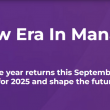IBM has made significant strides in its watsonx platform, revealing new open-source releases, product enhancements, and ecosystem collaborations at its annual THINK conference. These advancements aim to enhance the scalability, flexibility, and cost-effectiveness of artificial intelligence (AI) for enterprise use.
IBM’s CEO, Arvind Krishna, emphasized the company’s commitment to open-source AI as a core strategy, highlighting the importance of open innovation for the technology’s growth and ubiquity.
Mr. Krishna stressed the value of open-source contributions, likening the initiative to the successes of Linux and OpenShift. He articulated that openness promotes competition, innovation, and safety – key elements for any technology to gain widespread adoption. “Open means choice. Open means more eyes on the code, more minds on the problems, and more hands on the solutions,” said Arvind Krishna.
As part of its open-source push, IBM has released a family of Granite models. These advanced language and code models are now available under Apache 2.0 licenses on platforms like Hugging Face and GitHub. The Granite models, which range from 3 billion to 34 billion parameters, include base and instruction-following variants. They are designed for various tasks such as application modernization, code generation, bug fixing, and documentation. IBM’s testing shows that these models outperform larger open-source counterparts across numerous benchmarks, demonstrating their efficiency and capability.
In addition to the Granite models, IBM has launched InstructLab in collaboration with Red Hat. This novel approach facilitates the continuous development of base models through incremental contributions, similar to traditional open-source software development. InstructLab allows businesses to tailor AI models to their specific needs using their own data, ensuring direct value from AI integration. This initiative is part of the broader Red Hat Enterprise Linux AI (RHEL AI) solution, which aims to simplify AI deployment across hybrid infrastructures.
IBM’s commitment to expanding its AI capabilities is also reflected in its consulting services. IBM Consulting is launching a practice to help clients leverage InstructLab with proprietary data to train purpose-specific AI models. These models are scalable and tailored to meet the cost and performance requirements of different business needs.
IBM has also unveiled a new class of watsonx assistants. These tools are designed to help businesses overcome barriers to AI adoption, such as the skills gap, data complexity, and trust issues. Among the new offerings are the watsonx Code Assistant for Enterprise Java Applications, set to be available in October 2024, and the watsonx Assistant for Z, aimed at transforming user interaction with IBM Z systems, available in June 2024. These assistants are expected to streamline AI deployment and enhance operational efficiency across various domains.
IBM Expands its NVIDIA GPU Offerings
To support the growing demands of AI workloads, IBM is expanding its NVIDIA GPU offerings. New additions include the NVIDIA L40S and NVIDIA L4 Tensor Core GPUs, along with support for Red Hat Enterprise Linux AI and OpenShift AI. These enhancements are designed to address the needs of AI and other critical workloads, providing the necessary infrastructure for businesses to scale their AI operations effectively.
IBM’s ecosystem of partnerships continues to grow, with collaborations aimed at offering clients greater flexibility and model choice. Notable partnerships include AWS, Adobe, Microsoft, Palo Alto Networks, Salesforce, and SAP. Each partnership is designed to integrate watsonx capabilities into various platforms, enhancing the AI ecosystem and providing clients with more comprehensive AI solutions.
- AWS – IBM and AWS are partnering to bring Amazon SageMaker and watsonx.governance together on AWS. This collaboration offers advanced AI governance capabilities for predictive machine learning and generative AI models, simplifying risk management and compliance processes.
- Adobe – IBM and Adobe are collaborating on hybrid cloud and AI initiatives, integrating Red Hat OpenShift and watsonx into Adobe Experience Platform. They are also exploring the availability of watsonx.ai and Adobe Acrobat AI Assistant on-premises and private cloud.
- Microsoft – IBM’s watsonx AI and data platform is now supported to run on Microsoft Azure, available through IBM and its partner ecosystem as a customer-managed solution on Azure Red Hat OpenShift (ARO).
- Palo Alto Networks – The expanded partnership with Palo Alto aims to deliver AI-powered security offerings, enhancing security outcomes for clients.
- Salesforce – IBM and Salesforce are working to make the IBM Granite model series available on the Salesforce Einstein 1 platform, enhancing decision-making capabilities for AI CRM use cases.
- SAP – IBM Consulting and SAP are collaborating to accelerate cloud journeys and leverage the transformative benefits of generative AI. This initiative includes integrating IBM Watson AI technology into SAP solutions, with plans to make the IBM Granite Model Series accessible across SAP’s cloud solutions.
Predictive CIO Management of IT Environments
In the realm of automation, IBM is introducing AI-powered automation capabilities that allow CIOs to shift from proactive to predictive management of IT environments. The new tool, IBM Concert, set to be generally available in June 2024, will act as a nerve center for an enterprise’s technology and operations. It will provide generative AI-driven insights to identify, predict, and suggest fixes for problems, integrating with existing systems to offer a comprehensive view of connected applications.
Concert aims to streamline operations by eliminating unnecessary tasks and accelerating critical ones, making teams more efficient and responsive. Initially, it will focus on helping application owners, Site Reliability Engineers (SREs), and IT leaders manage application risk and compliance more effectively.
To further enhance its automation capabilities, IBM has announced its intent to acquire HashiCorp. This acquisition would enable IBM to automate multi-cloud and hybrid environments with HashiCorp’s Infrastructure Lifecycle Management and Security Lifecycle Management products, such as Terraform and Vault.
IBM is also unveiling several new generative AI-powered data products to improve how organizations observe, govern, and optimize their data for AI workloads. These products include the IBM Data Product Hub and Data Gate for watsonx, both planned for availability in June 2024.
In summary, IBM’s latest innovations and partnerships in AI are set to transform the enterprise landscape. By embracing open-source models, enhancing product capabilities, and expanding its ecosystem, IBM is positioning itself as a leader in AI at scale. These developments might promise to make AI more accessible, efficient, and impactful for businesses worldwide, driving the next wave of digital transformation.









